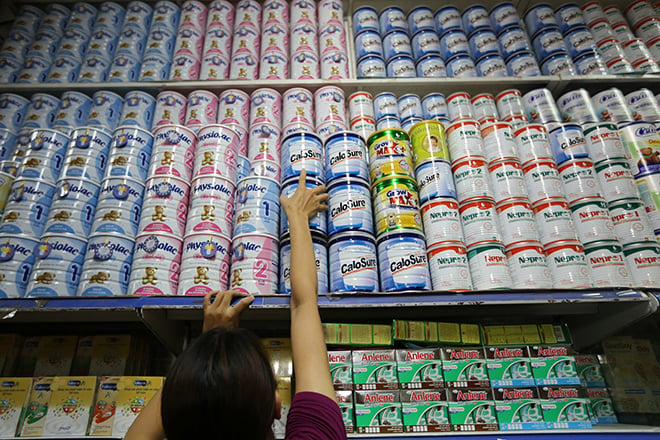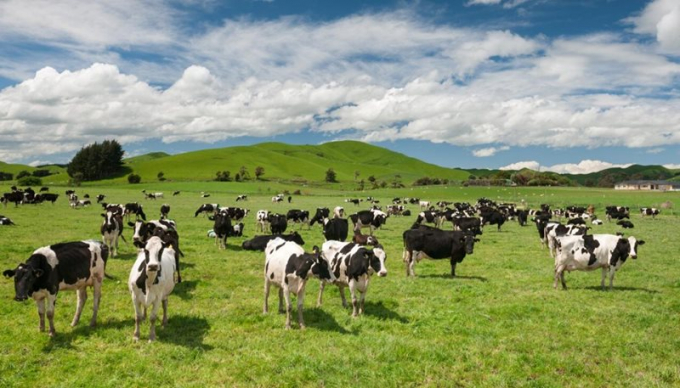November 22, 2025 | 16:04 GMT +7
November 22, 2025 | 16:04 GMT +7
Hotline: 0913.378.918
November 22, 2025 | 16:04 GMT +7
Hotline: 0913.378.918
According to the General Department of Customs, Vietnam’s import revenue of milk and dairy products last year was US$ 1.048 billion, an increase of 0.1 per cent compared with that of 2019.

Among imported milk and dairy products to Vietnam, powdered milk has the biggest import value.
New Zealand was Vietnam’s largest milk supplier last year as imports from Newzealand reached US$ 286 million, accounting for over 27% of the total import turnover of this commodity group of the country.
US was the second-largest milk supplier to Vietnam with import value reaching US$173 million or 16 per cent of total milk import turnover of Vietnam.
Other major milk exporters to Vietnam last year were Malaysia with the import value of US$ 66 million, Thailand US$ 62 million and Japan US$61.7 million.
Some EU countries were also exporting milk to Vietnam including Germany (US$42 million), Netherland (US$ 39 million), Ireland (US$ 33 million) and France (US$31 million). For the first ten months of last year, milk import turnover from EU to Vietnam reached US$ 170.1 million, accounting for 19 per cent of total share market and seeing an increase of 3.9 per cent compared with that of the same period in 2019.
The Europe-Vietnam Free Trade Agreement (EVFTA) is expected to boost the milk export from EU to Vietnam in coming time.
Under the EVFTA, import taxes for milk and dairy products including non-condensing milk/creamers, unsweetened milk/creamers or those containing a natural ingredient of milk from EU to Vietnam would be regularly decreased from 5 per cent to 0-3.5 per cent. Decreased import taxes will affect Vietnam’s milk imports.
In terms of kinds of milk, powdered milk was most imported into Vietnam. In the first ten months of last year, Vietnam imported powdered milk worth US$ 289.5 million, a decline of 8.9 per cent compared with that of the same period of 2019.
The import of skimmed powdered milk ranked the second with a total import value of US$ 231.5 million, an increase of 17.4 per cent compared with that of the same period of 2019. The import value of full cream powdered milk increased 16.2 per cent, reaching US$ 123.8 million.
Other kinds of imported milk and dairy products saw positive growths last year, for examples, UHT milk import value reached US$ 49.9 million, 64.3 per cent higher than that of 2019, food powder import value increased 38.6 per cent, yogurt 19.6 per cent.
However, import values of some other products declined, for examples, sweetened condensed milk 46.2 per cent, Anhydrous butterfat 25.6 per cent and butter 22.5 per cent.

Dairy cows are raised in New Zealand – the biggest milk exporter to Vietnam. Photo: Georgeherald.
Translated by Hien Anh
/2025/11/21/4309-2-153400_128.jpg)
(VAN) Green and low-emission rice is paving the way for Vietnamese rice to enter high-end markets, marking the beginning of a transformation journey toward greening and elevating the national rice brand.

(VAN) ‘Right to Win’ outlines a national action plan that shapes a new vision for Viet Nam’s agriculture in an era of renewal and global integration.

(VAN) Lam Dong’s farmed sturgeon output this year is expected to reach 2,300 tons, worth VND 450 billion, affirming the brand’s position on the market.

(VAN) A surge in Ukrainian egg exports, largely driven by soaring sales to the UK over the last few years, has notably pushed up egg prices on the domestic market.

(VAN) The price of Arabica Catimor coffee in Quang Tri is currently at VND 25,000–27,000/kg (fresh cherries), the highest level ever recorded

(VAN) 'From the coffee story, we can think deeper and further about the crop production sector - from development orientations and value-chain organization to international integration,' assessed Dr Le Quoc Doanh.
/2025/11/18/2431-0-161627_248.jpg)
(VAN) Viet Nam accounts for 43% of the world's export volume of Robusta coffee. However, the Vietnamese Robusta coffee brand has yet to gain broad recognition on the global market.